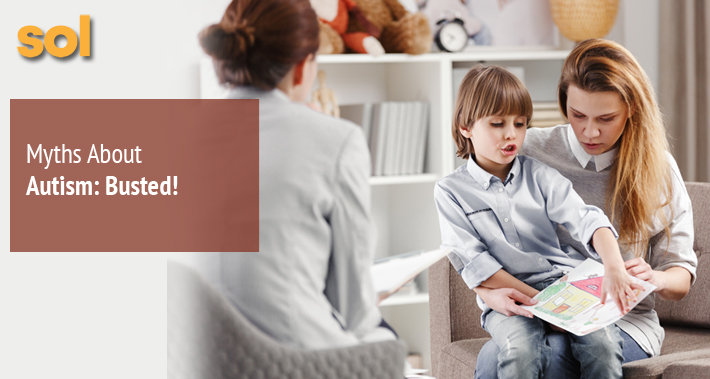
When your child gets diagnosed with autism, it can feel overwhelming.
Your head might be full of different myths or opinions about autism that you’ve heard before.
You might just be worried about your child’s future.
No matter how you’re feeling, you may be looking into things like speech therapy for autism.
Here at Sol Speech and Language, we provide speech therapy in Austin and Round Rock TX.
We are here to support your child in developing the speech and communication skills they need to navigate their lives.
And we do this through an evidence based practice, without giving power to any harmful myths that surround autism.
But what are some myths about autism?
Read on to learn more about some common myths about autism and what the truth actually is.
Myth: Autistic People Don’t Like To Be Social
You might have heard before that autistic people don’t like to socialize.
Or maybe even that autistic people are antisocial.
Maybe you’ve even met an autistic person who was quiet or shy or didn’t seem interested in socializing.
But that doesn’t mean autistic people in general don’t like socializing.
What’s The Truth?
The truth is, most autistic people enjoy having relationships and spending time with people.
They just might approach it differently than others.
Some autistic people need more support when it comes to their social skills.
This can look different for each autistic person.
For example, one person may be shy and quiet in social situations.
They may avoid social situations or struggle to speak when they’re around people they aren’t comfortable with.
On the other hand, some autistic people may seem to speak too much.
They may have trouble knowing when it’s someone else’s turn in a conversation.
Both these scenarios happen because many autistic people find unspoken communication confusing.
Things like body language, facial expressions, and tone are intuitive to many people, but are often hard for autistic people to interpret.
This can make it hard for autistic people to make friends or develop relationships.
But that doesn’t mean autistic people don’t want to socialize.
Spending time with an autistic person in an environment they feel comfortable in is a great way to support them.
Understanding how autistic people socialize can help you build relationships with them.
Myth: Autism Is Overdiagnosed
You may hear the sentiment that that autism is too common these days.
It is true that the rate of autism diagnoses has increased.
But does that mean autism has become overdiagnosed?
What’s The Truth?
Autism diagnoses have increased as our understanding of autism has expanded.
The more that doctors and other medical professionals understand autism, the easier it becomes to identify and diagnose autistic people.
This means that people who may not have been previously diagnosed are now able to be diagnosed.
In the past, these people might have just been seen as “weird” or “awkward”.
Treatment focused on forcing these kids to conform to what “normal” kids were like.
But now that we understand autism better, more people are being diagnosed and able to access the support they need.
This can also mean people understand themselves better.
In a similar way, the rate of left handedness increased dramatically once schools started recognizing that being left handed wasn’t a negative thing.
It’s just a difference in how the brain is wired.
Myth: Autistic People Have No Emotions
You may have heard the idea that autistic people can’t feel emotions.
Not only is this a myth, it can be very harmful to autistic people.
It can also lead into the myth that autistic people don’t like to be social, because they don’t have emotions.
Some people might also think that autistic people can feel some emotions, but not all.
This is also a harmful myth.
What’s The Truth?
Autistic people can feel all the same emotions as allistic people (those who aren’t autistic).
However, this myth comes about because autistic people may have more difficulty expressing their emotions.
Autistic people may also have more difficulty interpreting other people’s emotions.
This happens because the way we convey emotions is often through nonverbal cues, like facial expressions and body language.
Nonverbal communication can often be more challenging for autistic people to understand.
An inability to express emotions in a certain way doesn’t mean that autistic people don’t feel emotion.
Myth: Autism Is Something You’ll Grow Out Of
It’s common for people to think that autism is something you can grow out of.
Often, autism is something that is diagnosed during childhood.
But that doesn’t mean that once someone reaches adulthood they’re no longer autistic.
What’s The Truth?
Autism isn’t something you can grow out of.
It’s a difference in how your brain is wired, which means it affects development at every stage of life.
RELATED: Developmental Speech Milestones To Expect In Children
However, autistic traits can look different at different stages of life.
You wouldn’t expect anyone to act the same way at 21 as they did when they were 5, autistic or not.
Autism also isn’t something that can be cured with therapy or medicine.
Appropriate therapy, such as pediatric speech therapy for autistic children, can help support your child to develop more robust skills.
This might mean that your child who once struggled to speak can talk or write in full sentences in adulthood.
It might mean that your nonverbal child will gain mastery of their augmentative and alternative communication (AAC) as they grow.
Or, it might mean that your child will have one or two extra communication strategies that help them avoid sensory overload or meltdowns as they age.
Every autistic person is different.
While no autistic person will “grow out of” their diagnosis, they can still live happy and fulfilling lives.

Myth: Autism Is A Disease
Sometimes, people think that autism is a disease that can be cured.
People might think that, just like a disease, autism can be cured.
But it’s not.
What’s The Truth?
Autism isn’t a disease or something that can be cured.
Autism can’t be transmitted like a disease, and autistic people aren’t sick.
Autism is a neurodevelopmental disorder.
This means that autism changes how someone’s brain develops.
This usually causes differences in social interactions and communication, intense interests, and repetitive or restrictive behaviors.
With the right amount of support, autistic people can live happy and healthy lives.
However, support and therapies are not the same thing as curing a disease.
Providing an autistic person with proper therapy and support gives them more tools to be able to navigate a world that isn’t always compatible with how their brains have developed.
Myth: If Your Kid Is Autistic, It’s Your Fault
If you are the parent of an autistic child, you might have heard this before.
If you haven’t heard it before, you might have still felt like it was true.
However, this is also a myth about autism.
If your kid is autistic, it’s no one’s fault.
What’s The Truth?
There are a lot of factors that are linked to causing autism, but parenting style is not one of them.
No matter how you parent your child, it does not make them any more or less likely to be autistic than any other child.
This idea actually comes from a debunked psychological theory from the 50s.
It was called the Refrigerator Mother Hypothesis.
Basically, this theory said that if a mother is distant, neglectful, or not warm enough toward their child, it would cause autism.
It’s always the mother’s fault, isn’t it?
But this theory has been debunked for decades, and you may not even have known it existed.
Unfortunately, the negativity behind it seems to have created a lasting myth about autism.
The truth is, there are many factors that contribute to autism.
Even if your child’s autistic traits don’t become noticeable until they are a toddler, child, or young adult, there is strong scientific evidence that autism is present from birth.
Before your child ever experienced your parenting, they were autistic.
Myth: Autism Is Caused By Vaccines
The myth that vaccines cause autism is a myth as old as time.
Despite being debunked many times over, this myth is still quite common.
However, it’s frankly just not true.
What’s The Truth?
Just like the Refrigerator Mother Hypothesis, this myth comes from some dubious science that has since been debunked.
In the 90s, a scientific study was published that showed a possible link between vaccines and autism.
However, it was revealed pretty quickly that the experiment did not follow scientific standards, was deceptive, and the conclusion drawn was different from what the actual data said.
It has also been shown to be non-replicable.
This means that no one has been able to replicate the results of this study.
When a study isn’t replicable, it’s a big sign that something either untruthful or unscientific is happening.
In fact, the doctor who published the study was actually stripped of his medical license.
However, despite all evidence to the contrary, this myth still persists.
Book Your Appointment With Sol Speech And Language Therapy Today
At Sol Speech And Language Therapy, we’re here to help.
Speech and language therapy is in important part of therapy for autistic children.
We deliver therapies based in evidence, not myths, to help your child learn to communicate and navigate the world.
Book your appointment with Sol Speech And Language Therapy today.
6448 E Hwy 290 Suite E-108,
Austin, TX 78723
(512) 368-9488
» https://g.page/r/CfRfhOpEQm7BEAE
Sol Speech & Language Therapy
555 Round Rock W Dr E-221,
Round Rock, TX 78681
(512) 808-3953
» https://g.page/r/Cb5pwCTosSEfEBM
Sol Speech & Language Therapy offers personalized skilled intervention to those struggling with their speech and language skills. Services offered include screening, consultation, and comprehensive evaluation. We also provide one-on-one and/or group therapy for speech sound disorders, receptive/expressive language delay/disorder, stuttering/cluttering, accent reduction, and much more.